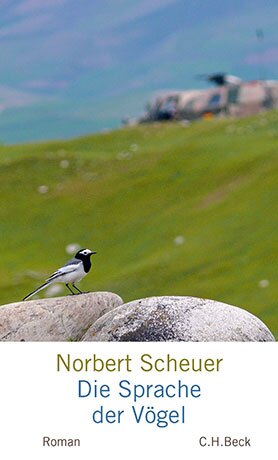Fiction
Norbert Scheuer
Die Sprache der Vögel
[The language of birds]
An Act of Humanity. Norbert Scheuer's extraordinary war novel “The language of birds”
A number of German authors have attempted to depict the war in Afghanistan along with the much debated dilemma of deploying troops locally. Critics unanimously agreed that no author has handled this difficult task as delicately and with such an original, poetic approach as the award-winning author Norbert Scheuer, whose novel “Die Sprache der Vögel.” [The language of birds] was nominated for the Fiction Prize of the Leipzig Book Fair 2015. Scheuer (b.1951), who lives in the Eifel, is known for his quiet, haunting prose works, which, without exception, are situated in the region and often focus on dreamers and misfits.
Scheuer’s Afghanistan story was inspired not only by an encounter in his hometown, but also through intensive research, interviews and narratives. The focus of the story is Paul Arimond, who was born in Kall a small town in the Eifel, and whose family name has appeared in Scheuer’s earlier works. The 24-year-old is stationed in Afghanistan as a medical orderly in the army from 2003-2004. He does not enlist out of a desire for adventure, nor is he politically motivated: The emotionally unstable Paul is running away from himself, family conflicts, relationship problems and a guilt trauma. Stationed in a camp in Afghanistan, he sees a shimmering turquoise lake in the distance from his watchtower and keeps a diary in which he reveals fragments of his personal history and records his impressions of the war.
While his comrades try to distract themselves from the daily horror and the dubious nature of their mission through alcohol, drugs or manic training programs, Paul Arimond takes a different tack that seems as bizarre as it is odd, given the setting and circumstances: he watches the bird world in Afghanistan in all its paradisiacal splendor and diversity. His father had awakened his passion for ornithology, and an ancestor named Ambrosius Arimond had traveled in 1780 to the mysterious Arcadian Afghanistan to continue his zoological studies. His dream was to decode the language of birds. Today his great-grandson, standing behind a barbed wire fence, notes the sonorous name of birds he spots and sketches their silhouettes with coffee, the only available material to paint with.
Paul’s walk to the lake, a splendid bird habitat, is prohibited. People remain trapped in a terror zone—birds are free. By setting these two worlds in opposition to each other, while building a tense, yet lightly fluid narrative structure, Norbert Scheuer creates an extraordinary view of the madness of war and the wounds it inflicts on all creation. The author has found a kind of optical parable for his poetics: “The Zeiss binoculars, 7 x 50, which his father used to watch the birds: While adjusting the eyepiece there is a tiny span between the absolute focus point and the blurring of contours - a moment comparable to that between reality and dream, memory and forgetting.”
His quiet, laconic language powerfully captures such interstitial moments; a subtle power of observation that allows the reader to understand, for example, the flight of birds ultimately is of greater importance than the man-made fighting squadrons flying over the desert. Much like Jonathan Trouern, the US soldier who during the Iraq war watched birds and wrote about it, he directs his gaze towards nature in the midst of everyday life during war, and this must be understood as a civilizing gesture—as an act of humanity and peace. A feat only literature can tentatively accomplish.
Translated by Zaia Alexander
By Kristina Maidt-Zinke
Kristina Maidt-Zinke is a book and music critic at the Süddeutsche Zeitung and also writes reviews for Die Zeit.


